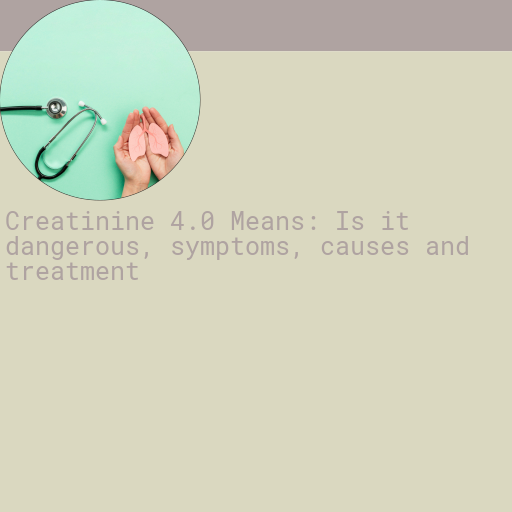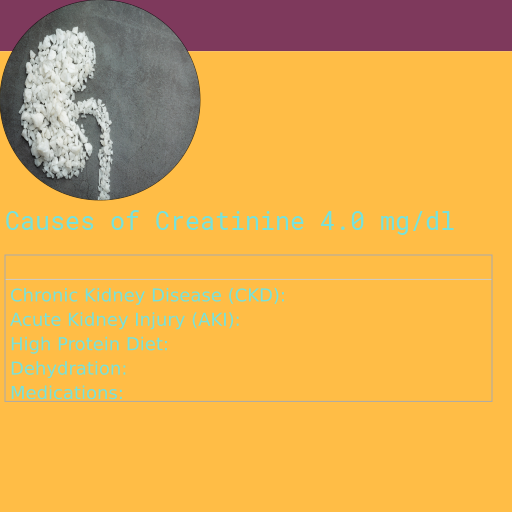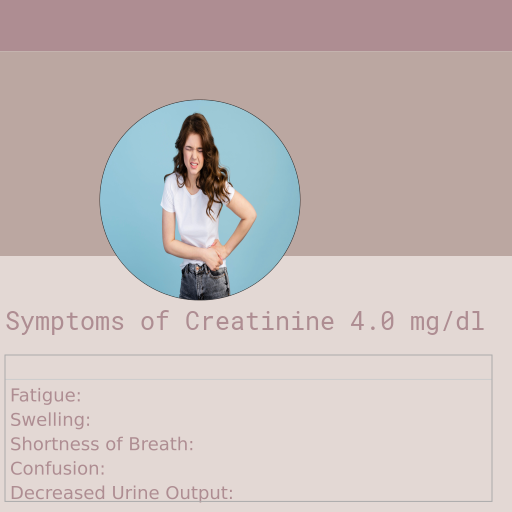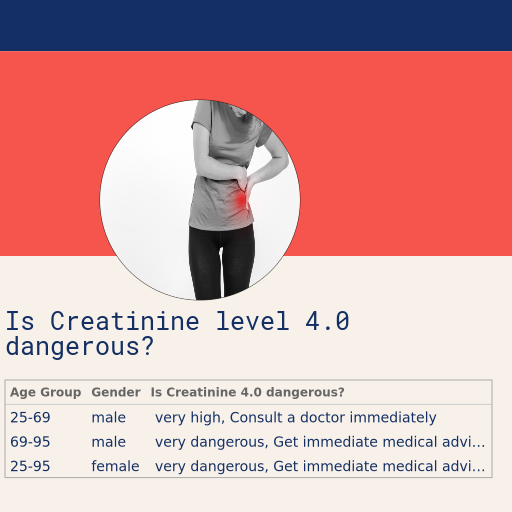Creatinine 4.0 : Is it Dangerous, Causes, Symptoms and More
Understanding the significance of a creatinine level of 4.0 is crucial for maintaining kidney health. Elevated creatinine levels can be a clear indicator of underlying health issues, particularly affecting the kidneys. This blog delves into the potential dangers associated with high creatinine levels, exploring the various causes that lead to this condition and highlighting the key symptoms to watch for. By gaining a comprehensive insight into these aspects, individuals can better navigate their health journey and seek appropriate treatment to manage their creatinine levels effectively.

What is Creatinine
Creatinine is a byproduct of protein breakdown and is considered a waste product that has no use in the body. It is produced from the normal wear and tear on muscles and is filtered out of the blood by the kidneys. When the kidneys are functioning properly, they effectively remove creatinine and other waste products from the body. However, elevated levels of creatinine in the blood can indicate potential kidney problems, as the kidneys may not be able to filter out these waste products effectively.
- Muscle Metabolism: Creatinine is a waste product derived from muscle metabolism. As muscles use energy, creatinine is produced as a byproduct.
- Dietary Intake: Eating foods high in protein, especially red meat, can increase creatinine levels, as they contain creatine, which converts to creatinine.
- Supplements: Consuming creatine supplements can lead to higher creatinine levels in the blood due to the conversion process.
- Medications: Certain medications, such as some antibiotics and nonsteroidal anti-inflammatory drugs (NSAIDs), can affect kidney function and elevate creatinine levels.
- Exercise: Intense physical activity can temporarily increase creatinine levels due to muscle breakdown.
- Kidney Function: Impaired kidney function is a primary source of elevated creatinine levels, as the kidneys are responsible for filtering creatinine out of the blood.
Normal Range of Creatinine in Adults
In adults, the normal range of creatinine levels in the blood can vary slightly depending on factors such as age, sex, and muscle mass. Generally, for adult males, the typical range is between 0.6 to 1.2 milligrams per deciliter (mg/dL), while for adult females, it is slightly lower, ranging from 0.5 to 1.1 mg/dL. These values are crucial for assessing kidney function, as elevated creatinine levels may indicate potential issues with the kidneys' ability to filter waste effectively.
| Age Group | Normal Creatinine Range (mg/dL) |
|---|---|
| 0 - 1 year | 0.2 - 0.4 |
| 1 - 3 years | 0.3 - 0.7 |
| 3 - 5 years | 0.3 - 0.8 |
| 5 - 10 years | 0.5 - 0.9 |
| 10 - 15 years | 0.5 - 1.0 |
| 15 - 18 years | 0.5 - 1.2 |
| Adult Women | 0.5 - 1.1 |
| Adult Men | 0.6 - 1.2 |
Causes of Creatinine 4.0
Elevated creatinine levels can be a concerning indicator of underlying health issues. Creatinine is a waste product produced by muscles and is filtered out of the blood by the kidneys. When the kidneys are not functioning properly, creatinine can accumulate in the blood, leading to elevated levels. Some common causes of elevated creatinine include chronic kidney disease, acute kidney injury, and conditions that reduce blood flow to the kidneys. Additionally, factors such as dehydration, certain medications, and high-protein diets can also contribute to increased creatinine levels. Understanding these causes is crucial for assessing and managing kidney health effectively.
- Chronic Kidney Disease (CKD): This is a progressive condition where the kidneys lose their ability to filter waste, leading to elevated creatinine levels.
- Acute Kidney Injury (AKI): A sudden decline in kidney function due to factors like dehydration, infection, or drug toxicity can cause a rapid increase in creatinine.
- High Protein Diet: Consuming an excessive amount of protein can result in elevated creatinine levels, as the kidneys work harder to excrete the waste products of protein metabolism.
- Dehydration: When the body lacks adequate fluids, the concentration of creatinine in the blood can rise because the kidneys are not able to excrete it efficiently.
- Medications: Certain drugs, such as nonsteroidal anti-inflammatory drugs (NSAIDs), antibiotics, and chemotherapy agents, can impair kidney function and elevate creatinine levels.
- Diabetes: Poorly managed diabetes can cause kidney damage over time, leading to increased creatinine levels.
- High Blood Pressure: Hypertension can damage the blood vessels in the kidneys, compromising their ability to filter blood and resulting in elevated creatinine.
- Muscle Disorders: Conditions like rhabdomyolysis or muscular dystrophy cause muscle breakdown, releasing creatinine into the bloodstream and raising its levels.

Symptoms of Creatinine 4.0
When creatinine levels rise, it often signals underlying health issues that need attention. Elevated creatinine can manifest through a variety of symptoms which may include fatigue, swelling or edema, particularly in the legs, and shortness of breath. In some cases, individuals might experience nausea or even confusion due to the imbalance of waste products in the body. Recognizing these symptoms early can be crucial for timely diagnosis and treatment of the root cause.
- Fatigue: Feeling unusually tired or weak can be a symptom of elevated creatinine levels.
- Swelling: Noticeable swelling in the face, hands, or feet, medically known as edema, may occur.
- Shortness of Breath: Difficulty in breathing can be associated with high creatinine levels due to fluid buildup.
- Confusion: Mental fog or confusion might be a sign of impaired kidney function.
- Decreased Urine Output: Producing less urine than usual can indicate a problem with kidney function.
- Nausea and Vomiting: Feeling nauseous or vomiting frequently can be linked to elevated creatinine.
- Muscle Cramps: Experiencing muscle cramps or spasms could be a symptom of high creatinine levels.
- High Blood Pressure: Elevated blood pressure often accompanies kidney issues and high creatinine levels.

Dangers of Creatinine 4.0
While creatinine itself does not directly harm the body, its elevated levels can signal underlying health issues, particularly related to kidney function. An increase in creatinine serves as a crucial indicator of potential kidney failure or other renal complications. When the kidneys are not functioning properly, they fail to filter out waste products effectively. This leads to the accumulation of other harmful substances such as urea in the bloodstream, which can have detrimental effects on overall health. Understanding the importance of monitoring creatinine levels can help in early detection and management of these serious health issues.
- Kidneys: Elevated creatinine levels can indicate chronic kidney disease or acute kidney injury, leading to impaired kidney function and potential kidney failure.
- Heart: High creatinine levels can be a sign of cardiovascular issues, such as hypertension, which can increase the risk of heart attacks and strokes.
- Liver: Although primarily a marker for kidney health, elevated creatinine can also indicate liver dysfunction, potentially leading to liver diseases.
- Muscles: Increased creatinine may result from muscle damage or disorders, such as rhabdomyolysis, affecting muscle function and health.
- Brain: Poor kidney function and high creatinine levels can cause a buildup of toxins, leading to cognitive impairment and confusion.
- Lungs: Elevated creatinine levels can result in fluid retention, causing pulmonary edema and difficulty breathing.
- Digestive system: High creatinine levels can lead to gastrointestinal issues like nausea, vomiting, and loss of appetite.
- Skin: Poor kidney function associated with elevated creatinine can cause skin problems such as itching and dryness.
Home remedies for Creatinine 4.0
Disclaimer: Elevated creatinine levels are a serious medical condition and cannot be effectively treated at home. If you or someone you know has a creatinine level of 4.0, it is crucial to seek immediate medical attention. Basic supportive care includes staying well-hydrated, following a low-protein diet, and avoiding medications that can further harm the kidneys. However, these measures are not substitutes for professional medical treatment. Always consult with a healthcare provider for a comprehensive evaluation and appropriate intervention.
- Stay Hydrated: Ensure you drink enough water, unless your healthcare provider has advised a fluid restriction. Proper hydration helps the kidneys function efficiently.
- Monitor Blood Pressure: Keep a close eye on your blood pressure. High blood pressure can further damage the kidneys, so managing it is crucial.
- Follow a Renal Diet: Adhere to a diet that’s low in sodium, potassium, and phosphorus. Consulting a dietitian specialized in kidney health can be very beneficial.
- Avoid Over-the-Counter NSAIDs: Nonsteroidal anti-inflammatory drugs (NSAIDs) like ibuprofen can worsen kidney function. Opt for other pain relief methods as recommended by your doctor.
- Regular Exercise: Engage in moderate physical activity to improve overall health, but avoid strenuous exercises that could put extra strain on your kidneys.
Treatment for Creatinine 4.0
When a creatinine level reaches 4.0, it is crucial to seek medical treatment by a doctor as it signifies serious kidney issues. The primary goals of treatment include stabilizing kidney function, which may involve managing blood pressure and blood sugar levels, stopping harmful drugs that could be exacerbating kidney damage, and addressing any underlying infections that could be contributing to the elevated creatinine levels. Timely intervention is essential to prevent further deterioration of kidney health and improve overall well-being.
- Medication Adjustments: Doctors may prescribe medications that help manage the underlying conditions causing high creatinine levels. These could include blood pressure medications, diabetes medications, or drugs specifically targeting kidney function.
- Dietary Changes: A renal diet can be crucial in managing high creatinine. This typically involves reducing protein intake, limiting salt, and avoiding foods high in potassium and phosphorus.
- Hydration: Proper fluid intake is essential for kidney health. Doctors often recommend drinking enough water to stay hydrated but advise against excessive fluid intake, which can strain the kidneys.
- Dialysis: In severe cases, such as acute kidney failure, dialysis may be necessary. This procedure helps remove waste products and excess fluid from the blood, thereby lowering creatinine levels.
- Lifestyle Modifications: Incorporating regular exercise, quitting smoking, and avoiding alcohol can improve overall kidney health and help manage creatinine levels. Additionally, stress management techniques can also be beneficial.
GFR with Creatinine of 4.0
When discussing kidney health, the concept of Glomerular Filtration Rate (GFR) often takes center stage. GFR is a measure of how well your kidneys are filtering blood and removing waste, providing a comprehensive view of kidney function. Unlike the absolute value of creatinine, which can be influenced by various factors such as muscle mass, age, and gender, GFR offers a more accurate representation of kidney health. This is because GFR calculations take these factors into account, giving a clearer picture of how efficiently your kidneys are working. Therefore, while a creatinine level of 4.0 can be alarming, understanding your GFR can provide a more nuanced understanding of your kidney function and help guide appropriate treatment options.
| Grade | GFR (ml/min/1.73m2) | Meaning |
|---|---|---|
| G1 | > 90 | Normal or high |
| G2 | 60 - 89 | Mildly decreased |
| G3a | 45 - 59 | Mild to moderately decreased |
| G3b | 30 - 44 | Moderately to severely decreased |
| G4 | 15 - 29 | Severely decreased |
| G5 | < 15 | Kidney failure |
What is my GFR for a creatinine of 4.0
| Age | Gender | GFR |
|---|---|---|
| 18 | male | 19.65 ml/m2 |
| 45 | male | 16.32 ml/m2 |
| 60 | male | 15.39 ml/m2 |
| 80 | male | 14.52 ml/m2 |
| 18 | female | 14.58 ml/m2 |
| 45 | female | 12.11 ml/m2 |
| 60 | female | 11.42 ml/m2 |
| 80 | female | 10.77 ml/m2 |
Table of danger posed by Creatinine 4.0 in male across different ages
| Age Group | Is Creatinne of 4.0 dangerous? |
|---|---|
| 25yrs - 69 yrs | very high, Consult a doctor immediately |
| 69yrs - 95 yrs | very dangerous, Get immediate medical advice and treatment. |
Table of danger posed by Creatinine 4.0 in female across different ages
| Age Group | Is Creatinne of 4.0 dangerous? |
|---|---|
| 25yrs - 95 yrs | very dangerous, Get immediate medical advice and treatment. |

Which other tests should be done for a creatinine value of 4.0?
When evaluating kidney function, it's crucial to consider additional tests that can provide a more comprehensive picture of renal health. Electrolyte levels, such as sodium, potassium, and calcium, play an essential role in understanding kidney performance and overall body balance. The renal profile, which includes measurements of blood urea nitrogen (BUN) and serum creatinine, gives insight into the kidneys' ability to filter waste from the blood. Furthermore, blood gas levels can indicate how well the kidneys are maintaining the body's acid-base balance. By integrating these tests with creatinine measurements, healthcare providers can make more informed decisions about diagnosis and treatment plans.
- Electrolytes: Monitoring levels of sodium, potassium, chloride, and bicarbonate can be crucial in assessing kidney function and overall fluid balance. Abnormalities in these levels can indicate renal impairment or other underlying health issues.
- Renal Profile: This comprehensive test includes measurements of blood urea nitrogen (BUN), creatinine, glomerular filtration rate (GFR), and other markers of kidney function. Elevated levels of BUN and creatinine can confirm kidney dysfunction.
- Blood Gas Levels: Arterial blood gas (ABG) tests measure oxygen, carbon dioxide, and pH levels in the blood. These parameters can help evaluate the metabolic and respiratory status of a patient, which can be affected by severe kidney disease.
- HbA1c: Glycated hemoglobin (HbA1c) levels provide an average of blood glucose levels over the past 2-3 months. This test is particularly useful for individuals with diabetes, which is a common cause of kidney disease.
- LDH (Lactate Dehydrogenase): Elevated levels of LDH can indicate tissue damage, including kidney damage. This enzyme is released during cell injury, making it a useful marker in diagnosing and monitoring renal conditions.
- Urea: Blood urea nitrogen (BUN) is a byproduct of protein metabolism. Elevated BUN levels can indicate reduced kidney function and are often measured alongside creatinine to assess renal health.
- Liver Enzymes: Tests for liver enzymes such as ALT, AST, and alkaline phosphatase can help determine if liver dysfunction is contributing to the overall clinical picture, as liver and kidney functions are closely linked.

 By: Dr.Bhargav Raut
By: Dr.Bhargav Raut